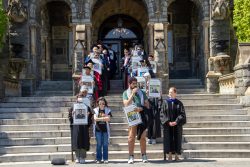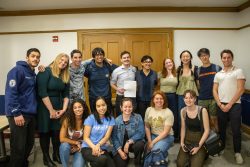The Board of Zoning Adjustment has placed a list of conditions on the University’s 10 Year Plan, including the rejection of the University’s request for an increase in undergraduate enrollment. Other conditions placed on the campus plan include the publication of all complaints received concerning student misconduct as well as the creation of a record of all license plate numbers of vehicles belonging to Georgetown students.
On November 8, 2000, the University requested that the BZA approve an increase of 389 students in the undergraduate enrollment. During the meeting, the five members of the BZA board voted in favor of the University’s campus plan with the plans to review a list of conditions which could be added at a later date.
In the order released on March 29, the BZA placed a condition that does not allow the University to increase the undergraduate enrollment above the cap of 5,627.
The BZA report states that community association parties argued in favor of maintaining the enrollment cap adopted in the 1990 University Ten Year Plan on the grounds that “large numbers of students living in the community cause a negative impact because of behavior, housing and other issues, and that the University’s efforts to mitigate the impact have not solved the problem.”
The Georgetown Residents Alliance also argued against increases in undergraduate enrollment. In a letter to the BZA, the GRA said the increase would cause “severe adverse impacts on the surrounding residential neighborhoods.”
Juan Gonzalez, Vice President of Student Affairs, said that the University has not decided what to do concerning the rejection of their enrollment proposal. Gonzalez said that he did not believe that the 10 Year Plan could be adapted to incorporate the new enrollment cap. “They affect us at the core of future growth implants,” he said.
Gonzalez said that he disagreed with the community’s argument that the enrollment increase would have a negative impact on the community.
“I absolutely disagree. The University has decided to build three new residence halls [and] we are going to renovate New South cafeteria for a student union,” Gonzalez said. “The University is taking great strides and advances working with students on and off campus.”
Another condition requires the University to make publicly available all data indicating the number and types of complaints received concerning student misconduct along with the outcome of each complaint. The sanctions imposed and fines paid must also be made available to the public.
The University must also report all of this information quarterly to the Office of Planning, the Zoning Administrator, the Advisory Neighborhood Council, the Alliance for Local Living and other community organizations that request it. The BZA report also states that the University must report all violations of the Code of Conduct to the parents or guardians of the students involved.
Gonzalez said that he was unsure whether the stipulations of this condition were entirely legal. “The university still must weigh all legal ramifications. We do not know if these are legal,” he said.
The BZA order also includes a condition which requires the Office of the Registrar to maintain an accurate record of the license plate numbers of all motor vehicles owned by University students. The condition states that the University should direct all students to register their vehicles according to District of Columbia regulations and should withhold parking privileges from students who do not comply with D.C. registration or reciprocity requirements.
Gonzalez said the the University’s legal counsel is currently reviewing the requirements for this condition.
The report also included conditions obligating the University to maintain at least 4,080 off-street parking spaces on campus to avoid encouraging additional cars off campus.
Conditions state that the University should also avoid scheduling events that attract large numbers of visitors to the campus at peak traffic times, should maintain a 24 hour telephone hotline to receive complaints regarding student misconduct seven days a week and should establish an annual community education workshop mandatory for all students living off-campus.
“The decision really asks Georgetown to act as a government agency. Is the University going to turn on its own student? (https://tomadamswc.com) No way. It violates students’ privacy,” said Justin Wagner (CAS ‘03), ANC Commissioner for 2E.
Wagner said it was too early to say what actions the ANC would take in regards to the BZA report.
Julie Green-Bataille, Assistant Vice President of Communications, said that the University administration was trying to understand the full implications of the BZA conditions. “We are reviewing the BZA order and trying to understand what options we have,” she said.
Gonzalez said that the construction of the Southwest Quadrangle would continue as planned. “Every significant unit is being asked to weigh and consider ramifications. [University President Leo O’Donovan, S.J.] is requesting the vice presidents and legal counsel to provide advice and counsel. We are going on with the Southwest Quad, all other building is unsure at this point,” he said.




